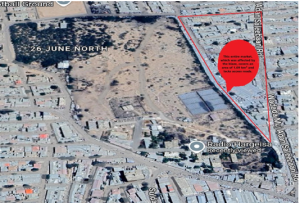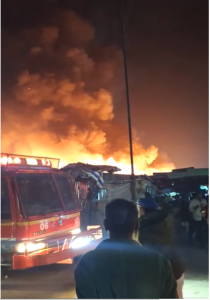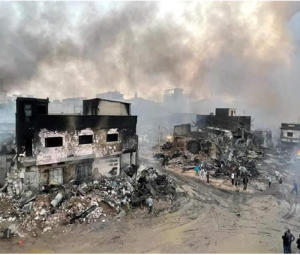Urban planning is a pivotal component of urban development. It serves as a guiding framework for construction companies, private property developers, and local councils, ensuring organized and sustainable growth. Effective urban planning not only leads to well-structured and developed cities but also strengthens the economy by attracting tourism and investment. For developed cities, urban planning remains crucial as it helps manage ongoing growth, optimizes resource allocation, and addresses emerging challenges like traffic congestion, pollution, and environmental sustainability. Furthermore, urban planning plays a critical role in fire prevention by ensuring proper infrastructure, such as firebreaks, emergency access routes, and building regulations that promote fire-resistant materials and safe designs, ultimately protecting both people and property.

In recent years, Somaliland has experienced devastating market fires, resulting in the destruction of livelihoods, economic losses, and long-term setbacks for small businesses and traders. These recurring incidents highlight a critical and long-ignored issue: the absence of effective urban planning and fire prevention infrastructure in the country’s commercial hubs across major cities. The recent fires that have ravaged Somaliland’s key markets, including Hargeisa’s Waaheen, Wajaale and Idacada Market, expose the vulnerabilities of an unregulated urban landscape and the urgent need for systemic reforms.
The Root Causes of Market Fires
The frequent market fires in Somaliland result from multiple interconnected factors, all related to poor urban planning, inadequate fire safety regulations, and limited firefighting capacity. Without Somaliland’s fire brigade, these blazes would be even more devastating, as there would be no means to contain or extinguish them.
However, despite their efforts, the fire department operates under immense pressure, struggling with limited resources, blocked access roads, and a lack of proper infrastructure, making emergency response extremely difficult. One of the primary issues is the overcrowded and unregulated nature of market spaces. Markets are densely packed with makeshift stalls, inadequate spacing between vendors, and poor access routes for emergency services. This congestion significantly increases the risk of fires spreading rapidly and makes firefighting efforts nearly impossible. Additionally, the lack of fire safety infrastructure exacerbates the situation, as most markets lack essential fire prevention measures such as hydrants, extinguishers, and trained personnel. Without formal emergency response plans or fire drills, traders remain highly vulnerable to disasters.

Another major cause, as highlighted by business owners and local government officials, is poor electrical wiring and unsafe installations. Many fires have been linked to faulty wiring, overloaded circuits, and unregulated power sources. The absence of regular electrical inspections and weak enforcement of safety standards further increases the risk. Compounding these issues is Somaliland’s limited firefighting capacity. Fire departments lack essential resources, including fire trucks, a reliable water supply system, and protective gear, severely restricting their ability to respond effectively to emergencies. Rapid urban expansion without proper planning has further aggravated the situation, particularly in cities like Hargeisa, where informal market growth has outpaced regulatory enforcement. The absence of zoning laws, designated fire lanes, and adherence to building codes has created a highly vulnerable environment, making Somaliland’s markets increasingly prone to devastating fires. Addressing these challenges requires urgent investment in urban planning, fire safety infrastructure, and regulatory enforcement to prevent further destruction and loss.
The Economic and Social Impact
Market fires have far-reaching consequences beyond the immediate destruction of goods and property. Thousands of traders lose their sources of income, leading to economic instability and increased poverty. The destruction of markets also disrupts supply chains, affecting consumers and businesses reliant on these trade centers. For a country where informal trade is a major pillar of the economy, these recurring fires present a severe setback to economic development. The devastating fire at Hargeisa’s Idacada that occurred last night, the full extent of the financial and economic losses is not yet officially recorded, but Hargeisa’s Waaheen Market

in April 2022 serves as a stark example of the economic toll these disasters take. The fire caused an estimated loss of around $1.5 billion, affecting nearly 2,000 businesses and leaving thousands of traders without livelihoods.The job losses were immense, as the market was the primary source of employment for thousands of families. With businesses destroyed, many employees were left jobless, increasing household financial distress. The impact extended beyond individual traders and employees, leading to a significant reduction in tax revenue for the government. Waaheen Market was a major contributor to Somaliland’s economy, generating substantial tax income that supported public services and infrastructure. The loss of this revenue further strained government resources, limiting its ability to provide essential services. Households’ dependent on market trade faced severe financial instability, with many struggling to afford basic necessities. The sudden loss of income forced families into deeper poverty, increasing reliance on social support systems and humanitarian aid.
The effects were also felt beyond Somaliland’s borders. Waaheen Market was a key trading hub for businesses from neighboring countries such as Ethiopia and Djibouti. The destruction disrupted cross-border trade, causing supply shortages and price hikes on essential goods. Ethiopian and Djiboutian traders who relied on Waaheen as a primary marketplace suffered significant financial setbacks, further straining regional economic ties. The recurring nature of these fires underscores the urgent need for robust urban planning, fire safety measures, and economic recovery strategies to prevent further economic devastation.
The Way Forward: Urgent Policy and Infrastructure Interventions
Addressing Somaliland’s market fire crisis requires a comprehensive approach that prioritizes urban planning, fire safety, and infrastructure development. The local and central government must develop effective collaboration to enforce zoning laws that ensure adequate spacing between market stalls, designated fire lanes, and proper market layouts to minimize fire hazards. Investment in fire safety infrastructure is also crucial, with the installation of fire hydrants, extinguishers, and sprinkler systems in major markets. Additionally, establishing a mandatory fire safety certification for businesses would help enforce compliance and promote a culture of fire prevention.
A major contributing factor to market fires is poor electrical wiring and unsafe installations. A regulatory body should oversee market electrification to ensure all installations meet safety standards, removing unauthorized electrical connections and educating traders on electrical hazards. Strengthening fire departments is another critical step, as limited resources and outdated equipment hinder their ability to respond effectively. The government must allocate additional funding to fire services, providing modern fire trucks, establishing more fire stations, and training both firefighters and market vendors in emergency response procedures.
Public awareness and education are essential in preventing fires and mitigating damage. Traders and business owners must be trained in fire prevention strategies, emergency response protocols, and the proper use of fire
Author: Kaiser Omar
Bandhige@gmail.com






























